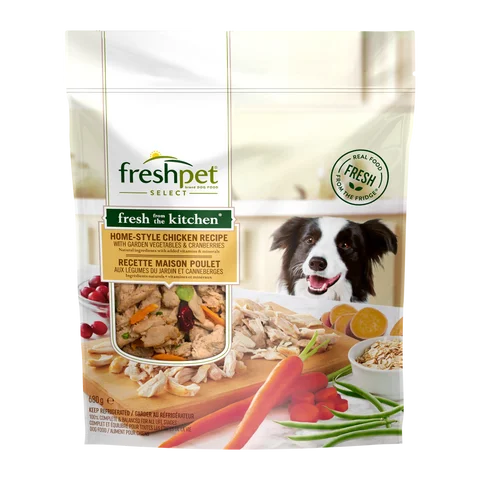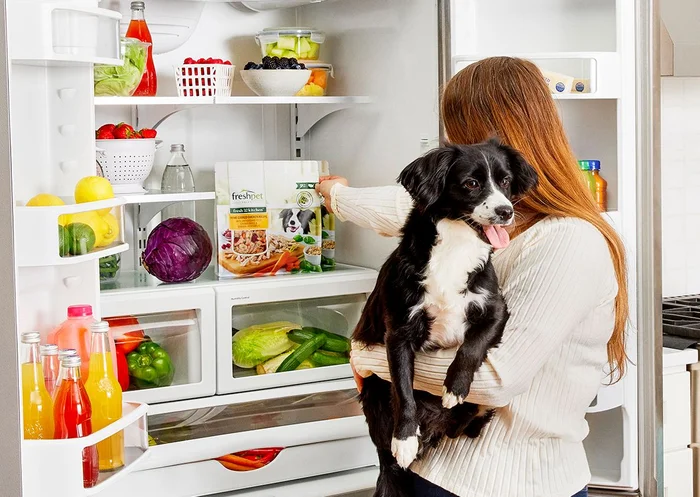


How to Help a Rescue Dog Adjust to a New Home
written by Freshpet
Adopting a rescue dog is a wonderful and rewarding experience, but it can also come with challenges. Many rescue dogs have lived through difficult circumstances, and the transition to a new home can be overwhelming for them. Just like people, dogs need time to adjust to new environments and routines. Providing them with the best dog food to support their health and comfort can also help ease their transition. With the right approach, you can help your rescue dog feel safe, secure, and loved in their new home.
When you first bring your rescue dog into your home, it's essential to provide them with a quiet, safe space where they can settle in without feeling overwhelmed. Many dogs, especially those who have experienced trauma, can feel anxious in unfamiliar surroundings. A designated space—whether it's a cozy corner with their bed, a crate, or a separate room—will give them the opportunity to explore at their own pace and feel secure.
Place a soft bed or blanket in the area and add familiar items such as toys or a piece of clothing that smells like you. This can help comfort them while they adjust to their new home. Try to keep the area calm and quiet, away from loud noises or bustling household activities, so your new dog can have some peaceful downtime.
Dogs thrive on predictability, and a consistent daily routine helps them feel secure. Establishing a routine for meals, walks, bathroom breaks, and playtime will help your rescue dog know what to expect each day. This will also help them understand that they are safe and that their needs will be met consistently.
Try to keep their feeding and bathroom times consistent. Training routines can also be helpful for giving them structure . If you're crate training, always use the crate as a positive and comfortable space. Over time, your dog will begin to associate your home with safety and stability, which will ease their transition.
Rescue dogs may need time to adjust to their new environment, especially if they’ve experienced past trauma. It’s important to take things slowly and avoid overwhelming them with too much too soon. You might feel eager to explore new activities, meet new people, or introduce your dog to other pets, but it’s crucial to allow them time to feel comfortable in their new surroundings first.
Let your dog come to you when they’re ready, and offer gentle interaction, including providing them with dog food they enjoy as a positive experience. Avoid forcing affection or play if they’re not yet receptive. Respect their boundaries and allow them to retreat to their safe space when they need to. The more patient and understanding you are, the faster they will begin to trust you and feel comfortable in their new home.
If your rescue dog has had limited social experiences, they may be anxious when meeting new people, animals, or environments. Socializing your dog gradually and carefully is crucial for their development.
Start by introducing them to people in low-pressure settings. Allow them to approach new people at their own pace and avoid overwhelming them with too many guests. When introducing other pets, ensure the first few interactions are positive and controlled. Dogs that are overwhelmed by aggressive play or tense situations may become more fearful, so it’s important to create calm introductions.
Be patient and consistent with socializing, rewarding positive interactions and offering plenty of reassurance. Over time, your new pet will begin to build confidence in new situations and people.
Positive reinforcement is one of the most effective ways to help a rescue dog adjust to their new home. When they behave in ways that you’d like to encourage, such as going to the bathroom outside, following a command, or sitting quietly, offer praise, treats, or affection to reinforce the behavior.
This will not only help them learn the house rules and commands but also strengthen your bond. Rewarding good behavior will make your dog feel confident, loved, and secure in their new environment. Be consistent with your reinforcement, and avoid punishment-based training methods, as they can cause fear and anxiety in your dog.
During the adjustment period, you may notice some behavioral issues, such as destructive chewing, separation anxiety, or fearfulness. These behaviors are often a result of stress or uncertainty as your dog learns to adapt. While these behaviors are common, they don’t have to become permanent habits. To properly address these behaviors:
Provide plenty of exercise and mental stimulation: Physical and mental enrichment can help your dog burn off excess energy and reduce anxiety. Regular walks, playtime, and puzzle toys can keep their mind engaged and prevent unwanted behaviors.
Crate training and safe spaces: If your dog struggles with separation anxiety, crate training can help them feel secure when left alone. Make the crate a positive and comfortable place, never a punishment.
Consult a professional: If behavioral issues persist, consider working with a professional trainer who specializes in positive reinforcement techniques or a veterinarian who can help with any underlying medical issues.
During the first few weeks in their new home, it’s important to schedule a vet visit to check your dog’s health and get any necessary vaccinations or flea/tick preventatives. Rescue dogs may have been exposed to illnesses or parasites, so a thorough checkup will ensure they are in good health as they settle into their new environment.
Discuss any behavioral concerns with your vet, as they may have insights or recommendations to help with the adjustment process. Regular vet checkups and a healthy diet will ensure your dog’s overall well-being as they adjust to their new life with you.
One of the most important aspects of helping a rescue dog adjust is to build trust and form a bond. Spend quality time with your dog each day, whether it's through gentle play, walks, or simply sitting with them. Let them see that you are a safe and dependable presence in their life.
As you form a bond, your dog will begin to feel more confident and comfortable in their new home, knowing they can rely on you for love, protection, and care. The trust you build together will last a lifetime and is essential to helping your dog feel like a valued and loved member of your family.
Helping a rescue dog adjust to a new home takes time, patience, and understanding. By providing a safe space, a consistent routine, and plenty of love—along with selecting the best dog food brands to support their health—you can help your new dog feel comfortable, secure, and loved. As your dog adjusts to their new surroundings, you’ll build a strong bond and provide them with the chance to live a fulfilling, happy life. The effort you put in during the adjustment period will pay off in the form of a loyal and well-adjusted companion who’s ready to enjoy their new life with you.
